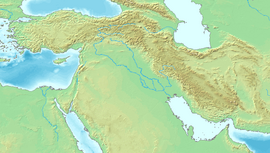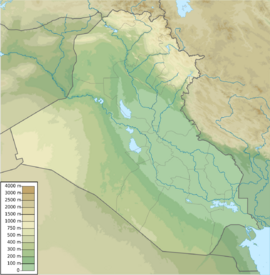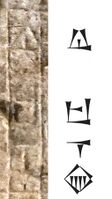Place:Pashime
From HandWiki
| Location | Tell Abu Sheeja, Iraq |
|---|---|
| Region | Mesopotamia |
| Coordinates | [ ⚑ ] : 32°23′38″N 47°8′53″E / 32.39389°N 47.14806°E |
| Type | Settlement |
| History | |
| Founded | 3rd millennium BCE |
Pashime, also Bashime (𒁀𒋛𒈨𒆠 ba-si-meKI), was an ancient region of southern Mesopotamia. It has recently been identified with Tell Abu Sheeja, Iraq, about 7 km from Iraq's border with Iran.[1][2] Pashime corresponded to an area of interaction between Mesopotamia and Elam. Its patron god was Shuda.[2] The city of Pashime was previously thought to be located on the Persian Gulf.[3]
A stele was discovered in Tell Abu Sheeja with the name of a Governor Ilšu-rabi, who has the same name as Ilšu-rabi the Governor of Pashime in the Manishtushu Obelisk inscription.[4][2] The inscription on the stele reads:
"For the God Shuda, Ilsu-rabi of Pashime, the soldier, brought in this statue. May the one who erases the name (on this inscription) not find an heir; may he not acquire a name (for himself)
-
Inscribed door-socket from the Temple of Šuda at Tell Abu Sheeja, Iraq. Ur III period, 21 century BCE. Iraq Museum.[2]
-
The name of Pashime (𒁀𒋛𒈨𒆠 ba-si-meKI) on the stele of Ilšu-rabi
Reference
- ↑ Crawford, Harriet (2013) (in en). The Sumerian World. Routledge. p. 162. ISBN 978-1-136-21912-2. https://books.google.com/books?id=qSOYAAAAQBAJ&pg=PA162.
- ↑ 2.0 2.1 2.2 2.3 2.4 2.5 Tell Abu Sheeja/ Ancient Pashime. https://discovery.ucl.ac.uk/id/eprint/1329444/1/Altaweel_accadica_131_1_Gig_Tap.pdf.
- ↑ 3.0 3.1 Hussein, A. M.; Hamza, H. A.; Thaher, A. K.; Kadhum, S. J.; Hashem, M.; Taha, H. M.; Altaweel, M. R.; Studevent-Hickman, B. (2010). "Tell Abu Sheeja/Ancient Pašime: Report on the First Season of Excavations, 2007". pp. 47–103. https://discovery.ucl.ac.uk/id/eprint/1329444/.
- ↑ Eppihimer, Melissa (2019) (in en). Exemplars of Kingship: Art, Tradition, and the Legacy of the Akkadians. Oxford University Press. p. 222. ISBN 978-0-19-090301-5. https://books.google.com/books?id=ZtGaDwAAQBAJ&pg=PA222.
- ↑ Eppihimer, Melissa (2019) (in en). Exemplars of Kingship: Art, Tradition, and the Legacy of the Akkadians. Oxford University Press. p. 222, note 26. ISBN 978-0-19-090301-5. https://books.google.com/books?id=ZtGaDwAAQBAJ&pg=PA222.


![Stele of Ilšu-rabi from Tell Abu Sheeja, Akkadian, Iraq. Iraq Museum.[2][5]](/wiki/images/thumb/8/88/Stele_of_Il%C5%A1u-rabi_from_Tell_Abu_Sheeja%2C_Akkadian%2C_Iraq._Iraq_Museum.jpg/139px-Stele_of_Il%C5%A1u-rabi_from_Tell_Abu_Sheeja%2C_Akkadian%2C_Iraq._Iraq_Museum.jpg)
![Inscribed door-socket from the Temple of Šuda at Tell Abu Sheeja, Iraq. Ur III period, 21 century BCE. Iraq Museum.[2]](/wiki/images/thumb/3/31/Inscribed_door-socket_from_the_Temple_of_%C5%A0uda_at_Tell_Abu_Sheeja%2C_Iraq._Ur_III_period%2C_21_century_BCE._Iraq_Museum.jpg/200px-Inscribed_door-socket_from_the_Temple_of_%C5%A0uda_at_Tell_Abu_Sheeja%2C_Iraq._Ur_III_period%2C_21_century_BCE._Iraq_Museum.jpg)

